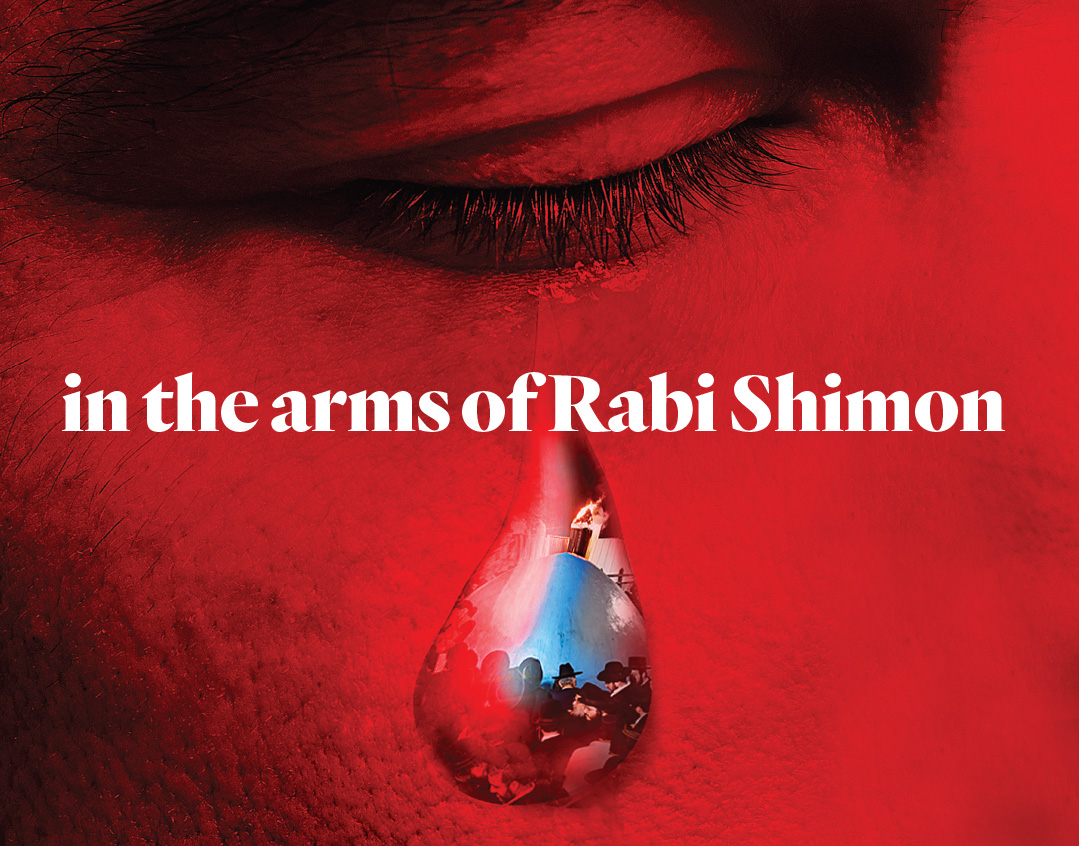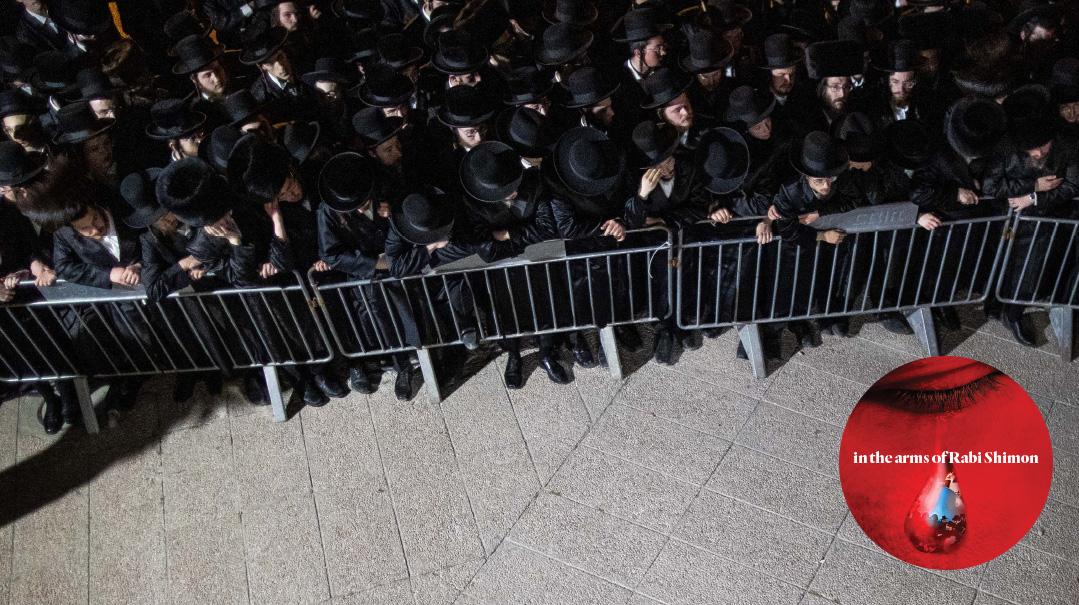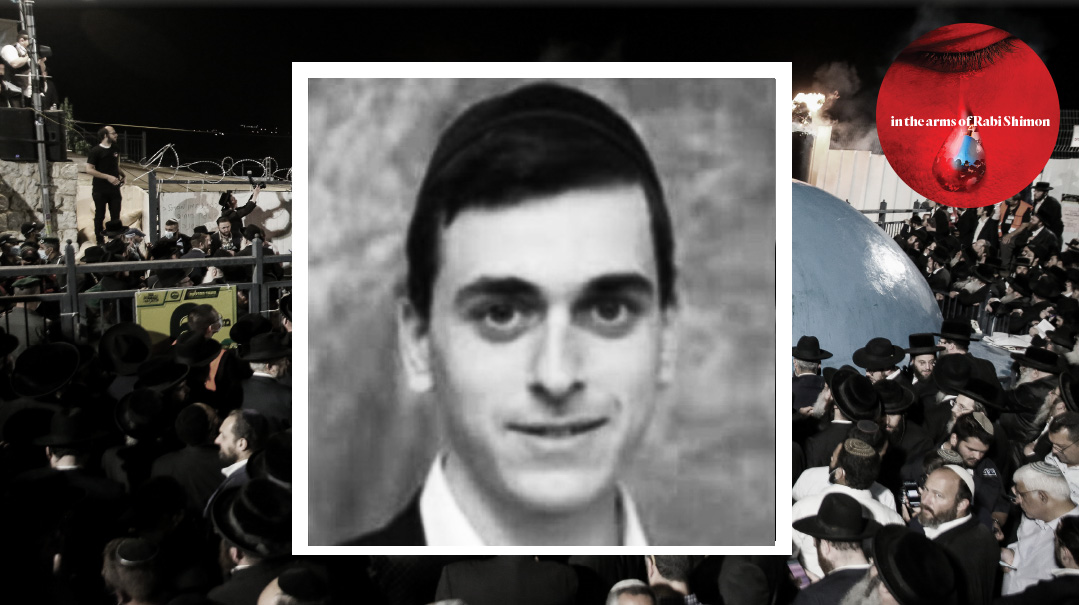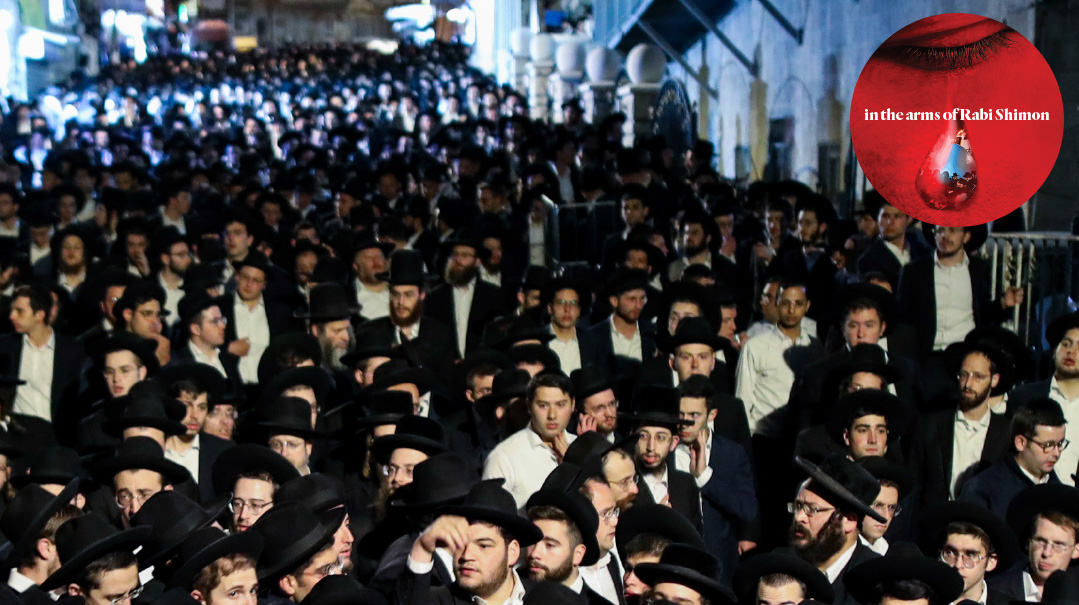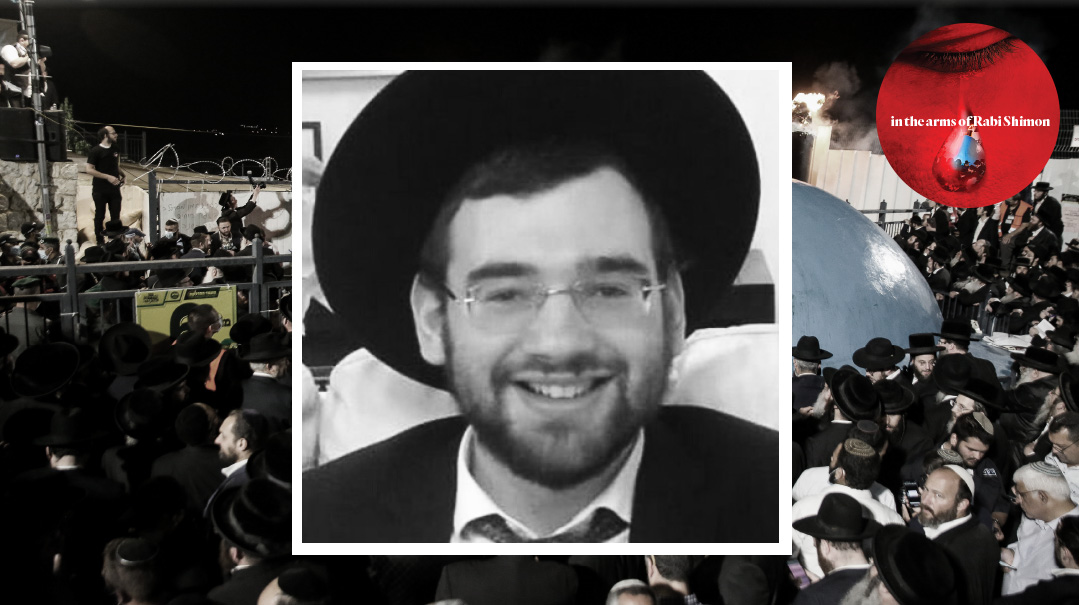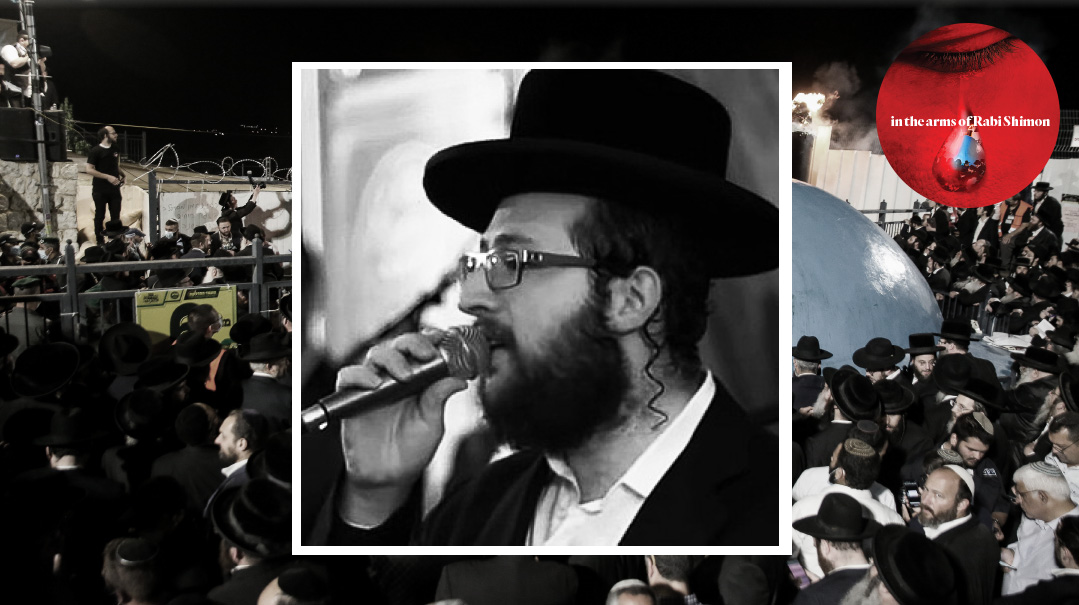From Across the Oceans

From Montreal and Manchester, Buenos Aires and Teaneck, each of these very different people had made their own way to the same destination
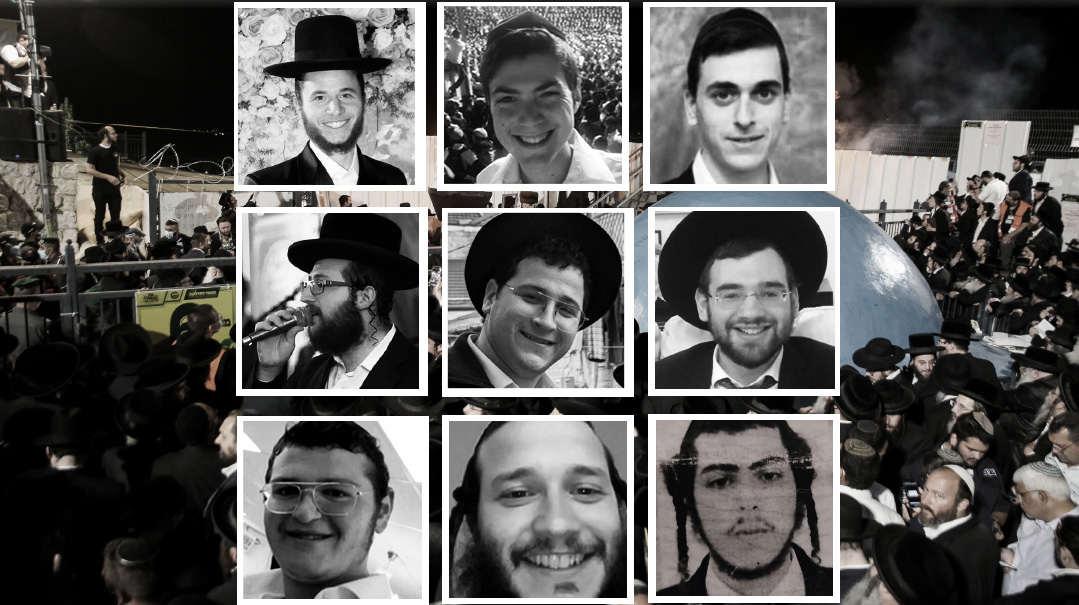
As the outpouring of grief across Israel and beyond has made clear, Meron 2021 will go down as a tragedy of the entire Jewish People — 45 holy souls, Jews of all types, who died minutes after beseeching kera ro’a gezar dineinu.
But of the many thousands drawn to the elevation of Rabi Shimon last week, and the hundreds who entered the horror that was the tunnel of death, one group stands apart.
From different cities, countries, and continents, they’d waved goodbye as they boarded a plane to learn in yeshivah and grow in kollel, to spend time in Eretz Yisrael or go directly to Meron. From Montreal and Manchester, Buenos Aires and Teaneck, each of these very different people had made their own way to the same destination.
Like the sepia-tinted pictures of the foreign-born bochurim learning in Chevron before the massacre of 1929, there’s an aching poignancy to the moving words of tribute and pictures that follow.
Because hovering behind each of their individual stories is the fact that of the entire Jewish People they’d been drawn together from across the oceans — as if by a giant magnetic force — into a scene of kiddush Hashem that no one foresaw.
Rabbi Eliezer Tzvi Joseph
27, Kiryas Joel
Rabbi Eliezer Tzvi Joseph preferred the quiet of the backstage for his acts of chesed, but knew when to step in when no one else was getting involved.
A brilliant talmid chacham, the young father of four managed to imbue his children — aged seven, five, three, and one — with a lifetime of emunah that everything the Eibishter did was for the best.
“They are holding up as well as possible under the circumstances,” said Reb Moshe Leizer Gottlieb, his brother-in-law and chavrusa. “The Eibishter gives koach.”
Reb Leizer Tzvi had recently completed learning the entire hilchos Shabbos under the auspices of Mivtzar HaKollelim, and was scheduled to take a farher on it this past Sunday at the beis din of the Eidah Hachareidis. Instead, his neshamah was in Yeshivah shel Maalah, having succumbed to the crowd crush during what his family thinks was his first time in Meron for Lag B’omer.
Born in Eretz Yisrael to Reb Yom Tov and Henya Joseph, the family moved to New York shortly before his bar mitzvah and settled in the Satmar shtetl of Kiryas Joel. Leizer Tzvi had a perpetual concern for helping others. From the time of his marriage to Fraidy — the daughter of Reb Yissachar Dov and Chavi Rosenberg — he made sure that his time in kollel would not interfere with his spousal responsibilities, helping out at home. He loved doting on his wife and children, doing what he could for them. His wife, in turn, is a powerhouse who labored strenuously so he would be free to pursue his Torah studies.
He established a gemach that gave out interest-free loans, called Zichron Moshe of Ohel Feige Beis Medrash.
“He would help out people who he didn’t even know,” said Reb Moshe Leizer, whose wife’s sister is Reb Leizer Tzvi's almanah. “He had a face that was always glowing, he had a smile on his face, always a good word for everyone.”
He had an urge to utilize every minute, as if he were aware that his journey in This World would be a short one. He began a chaburah that eventually grew to about 75 people to learn mussar seforim outside of kollel hours. He would learn with Reb Moshe Leizer during his off time, every night, on Shabbos afternoon, and on Motzaei Shabbos.
Reb Moshe Leizer recalled getting a call from his chavrusa last week: Reb Leizer Tzvi was at the airport gate and he had 15 minutes to learn. “We used to learn at nine o’clock every night. He had the time, so he didn’t want to waste it.
It was the last time they learned together. While leaving the Toldos Aharon area of Meron, Reb Leizer Tzvi was caught up in the crowd and passed away. Even during those final chaotic moments, however, he did not lose his composure. A man who was standing near him during those few minutes called the shivah house to tell the family of their father’s last words.
“I heard him say Shema Yisrael, again and again, until his neshamah left,” the overwhelmed man said. “His face was shining. He was totally recognizable.”
—Yochonon Donn
Dovi Steinmetz
21, Montreal
Dovi. I see you on your porch, surrounded by your family, laughter and warmth flowing down, embracing whoever might be walking by on a Yom Tov afternoon.
It’s a family trained to notice others, to share a good word, a compliment, or joke.
And in that special family, Dovi stood out.
With chein, with real kindness, he was the one who could take vulnerable teenagers and make them belong, because being his friend — and who wasn’t? — was enough. His confidence became theirs, his geshmak embracing them all.
Rebbeim too. Dovi was the one with the open heart and grateful smile, alive in the sugya, able to understand Tosafos’ kushya, but also to understand that maybe others didn’t feel the same excitement and it was up to him to share it.
Dovi’s parents made a chasunah a few months ago, at a time when the borders were sealed. The friends couldn’t come. Much of the family couldn’t come, including grandparents. It wasn’t simple.
And yet, a few nights before the wedding, Shloimy Steinmetz told me, “It’s true that it’s a challenge, but,” and with this, his face brightened, “but when I contemplate the fact that my son is getting married, shouldn’t that itself fill me with joy? The Ribbono shel Olam sent us an einekel this year, that isn’t a reason to sing? We’re healthy, we have parnassah baruch Hashem — so how can I complain? The Ribbono shel Olam gives and gives, we focus on that.”
Dovi went to learn in Yerushalayim, easily sliding into the familiar role of caretaker, dirah arranger, seudah supplier, smile provider; it was his way, learned from the best. He worked the phones, everyone in his network a shliach mitzvah to help the one who needed a bed, who had no seat, who couldn’t find a chavrusa.
He carried lists in his heart, the people and their needs, but his own name was last on every list. Dovi’s need was not to take, but to give.
To be that normal and that special? To give so much to others and still make the shtender your place?
Last Monday, he approached a friend in shul. “We’re buying an aliyah, you in?” He indicated a mutual friend. “He looks like he needs a boost, let’s do it.”
He had arranged this last Shabbos in Meron for the chaburah, and as happens, one guy showed up without confirming. There weren’t enough beds and it was becoming an issue — till Dovi walked in. “A bed? That’s the problem?” His eyebrows shot up. Come on. “Here’s a bed,” he said, pointing to his own.
He would figure it out.
Lag B’omer…. Dovi poured oil for the hadlakah in honor of Rabi Shimon, and took his place among Yidden, ready to dance.
“And if you knew Dovi, if you knew the purity and openness of his heart to hisorerus,” a rebbi of his told me, “then you know that during that last hour, he was in another place, at Ne’ilah on Yom Kippur, completely one of Rabi Shimon’s people.”
To his friends, part of them has gone, never to return until Mashiach comes. Dovi was the one they could turn to for listening, for understanding. He made them feel cared for.
A city, a small town that is like a family and the Steinmetzes a favorite sibling, is numb with grief.
A nation is writhing in pain.
And the family… How can they endure? With what?
On Sunday morning before the levayah, I davened Shacharis, as I do every day, in Mesivta Reishis Chochmah, where Dovi’s family davens, where his zeide and elter zeide davened too.
I saw his grandfather, the beloved gabbai Reb Itzu, seated by his daf yomi shiur, his shoulder square with dignity and strength. I watched him unfold his tallis, and I had a thought.
Later in the day, I watched the live stream of the kevurah taking place under the setting sun, night slowly spreading over the Holy City as Yissoschor Dov Berish ben Reb Shloime was laid to rest.
The video hadn’t yet cut off, and you could see and hear Shloime — until that moment, an onen absolved from tefillah — say “Okay, we need to daven Minchah, can I daven now?” and I had the same thought again.
The porch on Barclay Avenue in Montreal will yet be filled with warmth, with children and grandchildren who are happy to greet another Yid, to warm another soul, to brighten the day of another. They will continue to sing Dovi’s song.
Earlier this year, someone asked me for shidduch information on Dovi’s older brother, and I found the text I sent him then, my attempt to explain what makes the family special. I feel like the Steinmetz boys wake up every morning and say ‘Thank You Hashem for making me a Steinmetz.’
Dovi did. He lived in joy, and left us amid joy.
And if you know Dovi, you know that he will work there, as he did here, to “get it done” one more time, and we will reunite in joy.
—Yisroel Besser
Moshe Bergman
22, Manchester
T
he tragedy in Meron on Lag B’omer struck at the heart of every Jew all over the world, but what was so blatant was the fact that each of the 45 niftarim came from a different city, yeshivah, community, or group within Klal Yisrael. The Hashgachah Pratis is clear; it is obvious that Hashem handpicked each of these 45 korbanos.
My beloved talmid Reb Moshe Bergman ztz"l was chosen to be the korban of English Jewry.
With his love of Torah and sterling middos, Moshe was from the elite of our kollelim — Machon Hora’ah L’Rabbanim and the Second Seder Kollel.
Moshe, who was 22 and had been married for a year and a half, was the first new avreich to join the kollel during corona. With his broad smile and enthusiasm he infused life into a difficult situation.
Moshe always had an unparalleled love for Torah, but when he came to the kollel to learn halachah, this love soared to unprecedented heights. This was Toras chaim, because Moshe did not just learn Torah — he lived Torah.
We were learning hilchos Shabbos, and we discussed a difficulty in a particular hanhagah that is prevalent in Belz. That very night, Moshe was on the phone with the Belzer dayan to clarify it.
But that wasn't enough for Moshe, who was never satisfied until every side had been examined and scrutinized, until he had discussed it and rediscussed it with his rebbeim and friends. His extraordinary bikush ha’emes meant that he had to see it for himself, to elucidate all the details until the end, and so he went on Shabbos to daven in Belz. If the diyuk in the Shaar Tzion implied that dancing following Kiddush Levanah had to be exuberant, then after his last Kiddush Levanah, that was the way he danced, "like the Chofetz Chaim danced."
The same was true when we learned hilchos brachos. His wife told me that when the kollel learned about coffee, he asked her to keep out the kettle every night that week, for a coffee that he wanted to make, but didn’t... because he didn’t like coffee — but it was in his head and his heart. Schnitzel was also much more than just dinner; it was a sugya that came to life with a major discussion with his wife, because both were totally committed to living a life of Torah.
Moshe had an infectious smile, an expression of his lev tov. His good-heartedness was apparent when he thanked the avreich who arranged the minibus — every single day. He was extremely makpid about other people’s possessions and time. His chavrusa related that whenever they were finished using a sefer they had taken from the communal shelf, Moshe would immediately get up to return it, because he was concerned that "someone else" might need it, and "why should that someone else have to come look for it at our table, how can we waste someone else’s time?!"
His fellow avreichim in the kollelim describe seeing glimpses of his greatness when standing near him during davening. His beautiful voice and evident yiras Shamayim elevated not only every tefillah but every mispallel. The echoes of his "Amen Yehei Shmei Rabbah" are still heard and felt in the kollel.
On Lag B'omer he received a Heavenly decree of death. Rabi Akiva lost all of his 24,000 talmidim until this day. I lost my dear talmid on this day.
It is only now that I can truly begin to appreciate both the depth of the aveilus and the unfathomable greatness of Rabi Akiva, who was able to recover, rebuild, and renew all that was lost.
Only now can I appreciate, when I reflect on the depth of my relationship with my talmid, the special connection of a rebbi to a talmid. Chazal teach (Taanis 7a) that, "...but from my students I have learned more than from all of them." A rebbi can, in a certain sense, learn more from a talmid than the talmid can learn from him.
With a “teacher” as great as Moshe this Chazal is easy to understand. If we read this and make even one small change in ourselves, we will all be Moshe’s talmidim.
Rav Shraga Kallus, Rosh Kollel Machon Hora’ah L’Rabbanim and the Second Seder Kollel
Shragee Gestetner
33, Monsey
My brother was learning in the Skverer yeshivah in New Square, and he came home to Brooklyn one day with a CD of songs composed by a friend of his from yeshivah. I listened and was instantly moved. There was something about Shragee Gestetner, not just a beautiful voice, but a tremendous depth and sincerity. I immediately bought one of his songs, and we developed a relationship.
It became abundantly clear that he wasn’t just a composer, but a singer, with a special voice. He was eventually ready to record on his own, but it was important to him that his songs have a message, the words and the tune giving something to Klal Yisrael. He was addressing his people in every note.
I remember a trip we took together to record in Eretz Yisrael. He was so reverent and so erlich. We had to start the day with a real Shacharis, a serious Shacharis. We davened at the Kosel often, but Shragee also loved davening at the Churva shul, so we davened there on several mornings. He was makpid on pas Shacharis, according to halachah, and insisted I do the same.
His album was very well received, but fame wasn’t his goal — just the opposite. With success, he became ever more humble; it wasn’t about him. Money didn’t drive him, and I always remember how he would always pay my partner and me, his producers at the time, a bit more than he owed us, just to make sure he was being erlich and not taking money that wasn’t meant for him.
If he had an ambition, it was to go bring simchah to as many cholei Yisrael as possible, to brighten up as many hospital rooms as we could get to. That drove him.
And then one day, everything changed. He was done. He was at the peak of the industry, but he was leaving.
He would sing for family simchahs, he told me, but that was it.
He had two reasons, both of which meant the world to him. He wanted to be a father and husband, to be there for his family, and a wedding singer is out each and every night. He didn’t want that life anymore. At the time, he had four kinderlach and he felt it was time.
The second reason was that he wanted to start learning Torah seriously. He wanted to be a talmid chacham.
He started to wake up at four o’clock in the morning so he could learn a few hours a day and still work to support his family. At a siyum masechta, he reflected on how difficult it had been to break into learning Gemara seriously. He recalled being in Skver the previous Simchas Torah and davening, as he held the sefer Torah close, that HaKadosh Baruch Hu send him a good chavrusa.
It had worked out, and how, he said with great joy; he was completing his first masechta b’iyun.
In recent years, he had a new dream. There is an empty lot near where we live in Monsey, and he wanted to build a heichal haTorah, as he called it — not a shul or yeshivah, but a place where people could come learn Torah, at any hour of the day or night. He loved the Torah and wanted to share that gift.
Another kabbalah that became a part of who he was was his resolution that he would not talk in shul. Not by Kaddish, not bein gavra legavra, and not anywhere. He didn’t speak, at all, remaining the same friendly, pleasant Shragee, but fiercely maintaining this commitment.
He dedicated himself to Torah, to avodas Hashem, and to his family, as he’d hoped. He wouldn’t budge on that decision either. I know he was offered good money to accept a gig or event here and there, but he’d made a decision and he stuck with it. His six kinderlach were his main focus.
Shragee… remember him not for the sweet voice or even his sweet nature. Remember the ben Torah, the oved Hashem, the erliche Yid who used every moment he was given to create eternity.
—Gershy Moskowitz, as told to Yisroel Besser
Many times, the quality of a person’s voice are just an amplification of the qualities of his personal character.
It took only one encounter with Shragee Gestetner for me to realize what fueled the passion and charisma of his majestic voice, and what made his delivery on his second album — a collaboration with legendary composer Yossi Green — so impactful.
I lost my mother shortly before I turned 16. For my 17th birthday — my friends knew that I was a lifelong “music guy” — they wanted to do something special for me and decided to surprise me with a kumzitz by Shragee. One of the boys in my class lived in his neighborhood, and got him to agree to come perform for just $200. After a beautiful kumzitz, Shragee whispered to me that I should come with him to his car because he wanted to give me a brachah. We stood outside his car, and as he stretched out his hand to give me a brachah, he stuffed ten 20-dollar bills into my sweaty palms.
Sweet. Powerful. Larger than life — the voice perfectly amplified the soul.
—Chatzi Katz
Yossi Kohn
22, Cleveland
Yossi Kohn was his father’s son.
We knew his father as Mikey, but in Shamayim he is surely known as Harav Menachem Mendel. He blazed through Telshe Yeshivah and the Cleveland community like a comet of brilliant light. His passion for his Creator, His people, and His Torah lit us all on fire. Fifteen years on from the terrible day he was taken, his life and his legacy are still hot to the touch. He is alive in our hearts because he gave our hearts life.
Reb Menachem wrote a sefer in memory of his father. He called it Ateres Avi. And he left a son to whom he bequeathed his name.
Yosef Yitzchok Aizik.
Yossi.
The boy who grew up in a house bereft of one of its pillars but raised with the unshaken emunah of the other. Reb Menachem left nine children, and Mrs. Chaya Gitty Kohn tichyeh gave the world nine treasured reflections of his greatness.
Yossi was one of those reflections. The passion for life and the heart to share it with anyone he could. An awareness of what he was given by his parents, and the burning ambition to make his mother proud of who he was becoming.
And the joy. Most of all the joy.
With that joy, Yossi carried people. He lit up classrooms, yeshivos, and the gigantic world of the Mir. Yossi took individuals and made brotherhoods. Before he came around, they were boys randomly together under one roof. By the time his work was done, they were family. He was the one with crowds of friends, the uncle to whom the nieces and nephews swarmed, the kid with the easy smile and the open heart.
And with that very same joy, but with much less fanfare, he was the boy who once made a siyum in yeshivah, but not before writing out the shakla v’tarya of the entire masechta. He was the bochur who attached himself to rebbeim, who asked advice in overcoming challenges and passing nisyonos, and toiled tirelessly to put that advice into practice. The boy, who when asked before his final trip why he felt the need to go to Meron, said simply, “I have what to ask for. I need to shteig in my limud haTorah.”
For many years his father sat by the Seder of his shver. One year, he insisted on finally making his own Seder at home. He felt that it was time to ensure that his kids knew his minhagim. It was the final Pesach of his life.
Reb Menachem, you succeeded.
Yossi was seven when you were taken from him. And yet he knew your minhagim.
He knew how to pass on your fire. He knew that attaching yourself to Torah is the source of all joy. And he knew that the purest expression of that joy is to find a way to share it with someone else.
Menachem Mendel ben Yosef Yitzchok Aizik. Yosef Yizchok Aizik ben Menachem Mendel.
A mirrored reflection of a legacy that will forever live.
Each one a crown to his father. And a shared crown to the Father, who in His infinite wisdom and for reasons we cannot fathom, has brought them together again.
Ateres l’Avinu she’baShamayim.
—Shloimy Hoffman
Avraham Daniel Embon
21, Buenos Aires
I knew Avraham Daniel since he was born, and the pain of his loss hit me not only as a member of Klal Yisrael, but also as a close family friend.
He was a wonderful bachur, focused only on learning. He didn’t see it as an impostion, but as the only true way of living. I’ve been a rebbi in the kehillah for more than 30 years, and I know how rare it is to find a bochur in Argentina who isn’t at all interested in soccer. But he truly didn’t care about it. His passion was within the walls of the beis medrash.
Even since he was a young child he was very responsible, always on time to minyanim, to classes. I spent shabbatonim with him, camps, trips, davening, shiurim, and he was like that always. He got along with others; I never, ever saw him having difficulty getting along with another bochur.
I’ve known his father, Rabbi Dan Embon (also a rabbi in the kehillah), for more than 20 years, and I’ve seen how much he’s invested in imbuing into his family with the sense that Torah is the answer and the goal for everything. Everyone in Buenos Aires looks up to the Embons. Their married children all learn in kollel or are married to avreichim, and we were sure Avraham Daniel was going to follow that path as well.
Last Pesach, he came back to Buenos Aires, but because of COVID, we weren’t able to daven in the same minyan. We exchanged a few words, nothing significant, but I kept looking at this young man I’d known since he was a baby, who’d soon be in shidduchim. He’d changed, but his essence was the same. The same sense of responsibility, of focus, of understanding the goal of life. And having learned in Eretz Israel, he carried more Torah within. The natural path for an Embon.
When Hashem decided to take Avraham Daniel, we lost a pure neshamah, someone who never tasted ta’am chet, in a generation that faces so many nisyonos.
On Lag B’omer, while Avraham Daniel was in Meron for the first time, his father, Rabbi Embon, was gathered with other rabbanim, in a special learning l'illui nishmas Rabi Shimon Bar Yochai. At around 9:00 at night Argentinian time, rumors of the disaster started circulating. There was another rabbi present, who also had a child in Meron. He tried calling his son, but the lines collapsed, and he started to get nervous. “Don’t worry”, said Rabbi Embon, “the kids will be fine.”
The ending was tragic, but it also carries a message. The Embons are all about sharing the messages of emunah and Torah. That’s the way they raised their family, and that was the environment in which Avraham Daniel grew and turned into a neshamah tehora. May that emunah continue to accompany us.
—Rabbi Aharon Dlin of Kehillat Sucath David, Buenos Aires, as told to Yaakov Lipsyzc
Yosef Amram Tauber
19, Monsey
Yossi Tauber had just arrived in Eretz Yisrael for the first time four weeks ago to begin the zeman at Brisk. A star talmid of Rav Ephraim Wachsman at Yeshiva Meor Yitzchok in Monsey — “our crown,” as the rosh yeshivah referred to him in his heartrending hesped — Yossi stood out from among his peers in Torah and caring for others.
“Yosef Amram was a bochur who had a future of gadlus — gadlus in Torah, gadlus in influencing others, gadlus in yirah,” Rav Wachsman cried. “He was filled with so much insight in Torah, so much hasmadah, so much eidelkeit and wisdom.”
Rabi Akiva lost 24,000 talmidim during the days of Sefirah, he noted, but that plague ended on Lag B’omer.
“To lose such a talmid on Lag B’omer — how can we understand this?” Rav Wachsman exclaimed, sobbing. “Rabi Akiva’s talmidim didn’t treat each other properly — he was such a sweet bochur who treated everyone so nicely, constantly thinking about everyone, how to respect them and be their friend.”
Rav Menachem Weissmandl, the Nitra Rav of Monsey and a great-uncle of Yossi’s, told the Washington Post that he had watched his nephew grow up into a caring and thoughtful person. When the COVID pandemic began and residents of Monsey went into lockdown, he recalled, Yossi busied himself making sure that people had enough food, and he would make telephone calls to those who were alone.
“He was very smart, very charismatic, a lot of fun, good company to be in,” Rav Weissmandl said. “He was an extremely pleasant boy.”
Born to Rav Heshy Tauber — a rav in the Orange County village of Chester and a son of Rav Yechiel Tauber, the celebrated founder of Machon L’horaah — and his rebbetzin, Yossi had just gone to study in Brisk, arriving in Eretz Yisrael for the first time in his life. His visit to Meron for Lag B’omer was his first to the holy site.
His rosh yeshivah, Rav Wachsman, expressed awe at the grace and restraint the parents exhibited after losing such a refined son suddenly. He said he was confident that all the 45 Yidden who were killed in Meron on Rabi Shimon bar Yochai’s day must have had an association with the tzaddik.
“Yosef Amram, you originate from gedolei Yisrael and tzaddikim, and you were on your way to becoming one yourself,” he said. “When you go up to Shamayim, awaken the Middah of Rachamim on us! Gather together all the tzaddikim and tell them that Klal Yisrael cannot stand it anymore!”
—Yochonon Donn
Donny Morris
19, Teaneck
Taken just moments before the disaster unfolded, the delighted smile of Donny Morris z”l — framed by the multitudes who’d come to Meron — captures the before-and-after nature of what happened more than any other.
That smile, says Rabbi Noam Koenigsberg, his rebbi in Yeshivat Sha’alvim, was a fixture, evidence of a nature that radiated happiness. “He was such fun to talk to. As one of Donny’s friends pointed out, he even managed to smile while eating yeshivah-supplied wafers at our weekly gathering. Most people can’t do that. There was someone who had an emotionally difficult Elul who used to initiate conversations with Donny just because he knew that he’d feel better after.”
Underneath the perma-smile that he showed the world was a teen with a refined character and sensitive nature, focused on inner growth.
“At the beginning of the year, the boys were brainstorming for the four goals that we should be focusing on in the shiur,” says Rabbi Koenigsberg. “Donny stood up and said, ‘Wait a minute, you’ve missed the most important one: middos. When we come home at the end of the year, we won’t be discussing Abaye and Rava with our parents, so how are they going to see that we’ve changed if not our derech eretz?’ That was voted in thanks to Donny.”
That caring nature was evident when Donny was still young, as another rebbi at Sha’alvim makes clear.
Five years ago, Donny left the Rosenbaum Yeshiva of North Jersey, where he’d gone for elementary school. On Friday, when the news broke that he’d been niftar, a teacher at the school happened to show his picture to the non-Jewish janitor, and the man let out a gasp.
Surprised by the janitor’s emotion, the teacher asked him, “You remember him?”
“Him?” replied the man. “Of course, I remember him. He was the sweetest kid.”
What was it about Donny that made him so memorable? Why did the janitor remember him, five years later, among the hundreds of Jewish kids who passed through the corridors of the school?
“There is no doubt in my mind,” the rebbi muses, “that it was a daily hello or a friendly smile that etched his memory in the mind of the janitor.
“This just captures who Donny was,” concludes his rebbi. “With that chein and smile, by taking three seconds to say good morning, he made an impact that was remembered years later.”
During the year that Donny spent in Sha’alvim, he thrived in Torah-learning, both in terms of hours spent and his own achievements. At the emotional levayah, watched online by tens of thousands, the story was told of how during Elul, Donny had asked his friend to wake him up for Shacharis, in an unusual way.
“Wake me up by blowing the shofar,” said Donny.
“Why do you need a shofar?” wondered the friend.
“Because I want to be woken up with a feeling of Elul,” came the touching reply.
—Gedalia Guttentag
Pinchas Menachem Knoblowitz
22, Boro Park
Named for the Pnei Menachem of Gur, Pinchas Menachem Knoblowitz had all the traits of his namesake. “How would this advance my learning?” he asked himself when choosing a dirah or a yeshivah, or looking into a shidduch. He was the one thinking about society’s forgotten and actively seeing to help others.
Menachem found a mirror image of himself when he got engaged this past Chol Hamoed to Hindy Rozmarin from Lakewood — a Gerrer family whose father grew up in Eretz Yisrael, a home steeped in chinuch and chesed. He went back to Eretz Yisrael with a bounce in his step as he looked forward to his chasunah, scheduled for after Succos.
His tragic petirah on Lag B’omer devastated both families.
“It looks like I was not worthy to have such a husband,” the kallah confided mournfully to a friend.
Menachem seemed to be born with a festive disposition — he was born on Hoshana Rabbah, became a chassan during Pesach, and was niftar on Lag B’omer. His father, Reb Dovid, from Moshav Komemiyus in Eretz Yisrael, was close to the Pnei Menachem and named his son for his rebbe; his mother is the former Tova Glick.
Menachem grew up with a keen sensitivity for other people, said Asher Agassi, a close family friend whose son was with Menachem that fateful night last week. His son, Dovid, learned with Menachem on and off over the years, including during the COVID lockdown last year, when Menachem would come over to his house and the two would learn outdoors.
“He was a real serious boy, a chassidishe and erliche bochur. He just wanted to sit and learn,” Rabbi Agassi recalled. “He ran away from politics and machlokes — that’s why he wanted to learn in Mir, so he could focus totally on his learning.”
When he came home for his sister’s wedding two years ago, he told his father, “Ta, I need a chavrusa,” Rabbi Agassi said. “Life revolved his learning.”
He had enormous respect for his parents. When selecting a dirah, he had one condition — that nobody there have a smartphone. Early to bed, early to rise, Menachem grew tremendously over the years spent learning in Eretz Yisrael.
When he and his friends became shidduch age, Menachem took an active interest in helping those who would naturally have a harder time, urging his mother to make calls on their behalf. Rabbi Agassi recalled once taking him to the kever of the Lubavitcher Rebbe in Queens. Along the way, Menachem discussed a list of people who needed help.
“I was thinking,” Rabbi Agassi said, “how does such a young person think of having to help so many people?”
Menachem had grand plans for this Lag B’omer. He rented an apartment in the village of Meron for Shabbos for himself and his friends and left Jerusalem early in the day to help them organize.
Rabbi Agassi’s son Dovid was with him at the hadlakah of the Boyaner Rebbe, which ushered in the auspicious day, but the two got separated afterward. When Dovid heard about the fatal crowd crush, he rushed over there, fearing that his friend was involved. He himself got caught up in the crowd but managed to extricate himself.
The sad news came shortly afterward.
“He was like a diamond,” Rabbi Agassi said with a sigh. “He was gold.”
—Yochonon Donn
(Originally featured in Mishpacha, Issue 859)
Oops! We could not locate your form.






